| 136 | Steinschlagschacht | 2/S + |
|---|
| 136 | Steinschlagschacht | 2/S + |
|---|
Relocated in 1996. From main summit, drop down east to a bare limestone shelf. Follow this ~NE for some way (c 200m) until a way down east again reaches a small group of holes/shafts/rifts (CUCC 1997-07, 209, 136c, 136b). Cross this area south, initially keeping close below a small cliff to your right. After passing 136b, 136a is a little off to the left (east) of the cliff at the south end of the karren shelf. (See area map in NotKH survey book p88-89). The entrance is in a depression and is marked by, and under, a large (3m cubicish) boulder with a faint (in 1996) '136' painted on the S side, and a Tag.
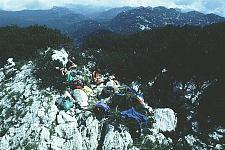
From Top Camp, proceed via the 161 approach up to the point (immediately past 1623/147) where a short climb down through the bunde drops onto a large, wide, grassy area perhaps 200m before reaching Vd1 and 30m higher. Cross the grassy patch, contouring around the hill and then take the 3rd steep grassy bank up to the right, through some bunde (this is not the most obvious slope). Climb up to the limestone shelf above and then continue contouring around the hill at roughly the same level for a further 300m to the entrance.
1983 description is : shaft -194m. The bottom was reached in 1984, at depths variously estimated -240m, -260m and -285m, when the rift became too narrow. 1983 survey (which was never drawn up) only goes to -194m.
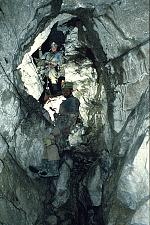
The rope (60m used in 1997, though this is not generous) for the first pitch is belayed to the 3m boulder. A short drop from the surface (c.3m) leads to the top of a steeply inclined boulder slope which is also very loose. The head of the main entrance pitch hang used to be immediately at the foot of this slope, however it has now been rigged from the right hand wall, out of the immediate line-of-fire from the boulder slope. A traverse line of around 10m at 30° is rigged on the right hand wall to reach the pitch head. The main hang is around 35m almost free-hanging, but for a minor deviation about 8m below the pitch head.
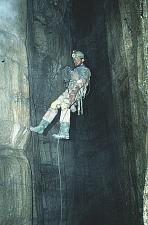
From the foot of the entrance pitch, a fairly narrow slot with a short climb down (c 1m) connects to a large boulder-strewn chamber. This chamber is entered from the top left corner (standing looking down the slope) and the main way on is around 10m down the slope, under a very large boulder towards the right hand wall. At the foot of the chamber are two large holes of around 5m depth, one in each corner. One of these holes has a spit above it, suggesting it was descended in 1983/4, however no descent was made of either hole in 1997. It is speculated that these may connect to the second pitch at a lower point than that used as the pitch head in 1997.
Returning to the main route down, the head of the second pitch is a belay point on the right hand wall of the chamber immediately above a very large perched boulder at "floor" level. A 130m rope was initially used here, though some spare was later cut off. Beware of apparently sound footholds here as they have a habit of falling off down the next 70m or so of the pitch series! A rebelay is required just below the take-off point on the boulder to avoid rubbing the edge of the block on the way up. This rebelay is particularly awkward on the way up since the rope tends to pull into the crack between wall and boulder. The shaft continues down more or less vertically for a further 3 rebelays (50m) until the first substantial ledge is reached. (A deviation is required below the 3rd rebelay from the pitch head to avoid an otherwise serious rub just below the rebelay bolt).
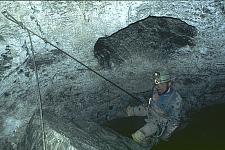
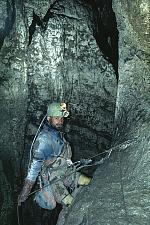
From this ledge, a further pitch descends, rigged from two bolts on the left hand wall with an immediate deviation off the right hand wall. Traversing ahead over the pitch, it appears that there is a parallel shaft visible through an eyehole in the left hand wall. It is believed that this is the shaft described as being accessed by a "desperate step across" which was descended in 1984 and found to reconnect to the wet route lower down.
Descending from the ledge, a further substantial ledge is reached after c8m. On the way up it is advisable to cower under the overhanging wall of this ledge to avoid exposing yourself to rocks dislodged by people on the pitch above - the pitch head is especially loose.
From the ledge an awkward take-off to an almost immediate rebelay leads to a connection with a wet shaft - the main source of water below this point. The hang is fortunately almost dry, aided by a very wide rebelay about 12m below the ledge. A further 15m hang reaches another large ledge where water continues through a large slot in the floor at the foot of the pitch. It is at this point that the two routes diverge into Wet Dreams (the way explored in 1983/4) and the Eyehole Route.
The Eyehole Route is to-date the main route in 136, leading eventually to the 1997 connection with the Forbidden Land in 161, and the 2½km Chile series, found in 1999.
The eyehole is reached by means of a traverse over the slot in the floor (through which the water disappears) and is the obvious large hole on the right. A short horizontal rift, with a steeply-inclined hole in the floor, connects to the head of the fourth pitch series. This pitch series is about 30m of dry shaft, broken by three ledges and landing on a much larger ledge with a couple of large boulders jammed in the exit rift. A 54m rope was sufficient in 1997. From the foot of the fourth pitch, the head of the fifth is only a few metres away over the jammed boulders.
The head of the fifth pitch does an extremely good job of hiding the enormous cavern into which it breaks some 10m below. Do not be mistaken into believing that the floor, as it appears, is only 5m below your feet, nor that your light will be even remotely adequate for ensuring maximum exposure on the multiple hanging rebelays below. The pitch starts with a large Y-hang across the rift at the pitch head.
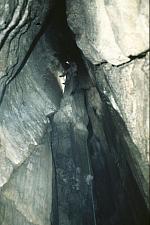
An airy traverse around the corner to the left (rigged rope) leads eventually to the Footlights Traverse. (The eyehole immediately opposite the pitch head connects with the climb around to the left).
Below the Y-hang is a large, mud-covered outcrop of rock, over which you must traverse before proceeding further to a very wide deviation, hated by those with short legs, just below the muddy "floor". A further 5m descent leads to a smallish ledge with another rock outcrop to cross to a hanging rebelay on the left-hand wall. This point is around 60m above the floor of the chamber and is where the Gods' Traverse begins. A 35m rope was sufficient to reach this point in 1997.
Continuing straight down from the rebelay, first a parallel shaft is reached and the wall of the chamber becomes convex, requiring another hanging rebelay 21m below the last. A further 24m hang drops to a boulder floor at the top of a huge chamber - The Theatre. The landing point for the main route into the Theatre is at the top of the steeply inclined floor.
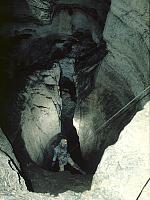
Standing at this point, looking down the slope of the floor, an opening at the bottom of the chamber of the left-hand wall leads to the Orchestral Pit. From the foot of the chamber up a short (c 8m) climb over mud and boulders and then up another (c 8m) climb on steep rock, leads to a small opening. (The rope has been left permanently rigged on this climb). On the right hand wall at the foot of the chamber is a boulder choke through which it is possible to climb down around 10m. No recommendable leads were found here. Immediately behind the landing point and around 30m higher up the wall is the connection to the Forbidden Land (161) which must be reached via the God's Traverse.
Proceeding up the 16m climb from the floor of the Theatre, a narrow opening leads to a precarious climb down the other side (c.5m) over the top of a large wedged boulder in a rift chamber, Exit Stage Left. There is an aven in the roof of this chamber, which can be descended as a pitch (the 30m continuation of Plughole Pitch) from the end of the Footlights Traverse. A second aven is reached by a short (c 3m) climb up opposite the entry climb. A small window (too small for human access) in the left hand wall of the chamber connects to the undescended pitch accessible from the rock bridge 18m down Plughole pitch, 26m above. Rocks can also be thrown in through a small gap in the boulder floor. This pitch continues below this level.
In the Orchestral Pit, a number of wet shafts connect from the ceiling in addition to a number of dry avens. The dry avens nearest to the Forbidden Land have been connected to an eyehole on the God's Traverse around 15m above the connection to Elin Algor. The floor of the Orchestral Pit has a number of pools and also a considerable amount of brown powdery mud, similar to that found in the horizontal areas of Kaninchenhöhle such as Mississippi Mud Pie, Triassic Park etc. , of which the majority of 136 is devoid. No leads were found in the Orchestral Pit.
The earlier (and lower) of two impressive traverse routes off the fifth pitch, The Gods' Traverse heads NE towards Kaninchenhöhle, to which it eventually connects.
From the hanging rebelay 10m below the head of the 5th pitch (on Eyehole Route), a short (4m) descent with a swing leads to a small muddy sloping ledge, with precipitous drop. A bolt in the middle of the traverse "protects" a caver who teeters around the ledge and up a short (c.2m) climb over a corner bulge onto the main face of the traverse. This roughly horizontal section is about 12m in length across a slab of limestone inclined at 70 - 80 °. Should your lighting equipment allow, you will be able to admire the enormous vertical rock-face which forms the opposite wall of the Theatre and the precipitous drop to the floor 40+ metres below. Hand holds (barring the rope) are non-existent on the second half of the traverse and most foot ledges were of the disposable type (single use only), now long gone. At the far end of the traverse a hanging rebelay just over the edge of the wall leads, with a wide swing, to a large eyehole on the opposite wall. A short (15m) pitch against the wall on the outside of the hole leads to a large muddy sloping ledge at the back of which is a hole into narrow traversy passage. This is the final impressive overlook reached in Elin Algor from the Forbidden Land in Kaninchenhöhle in 1996. The whole of the pitch - traverse - pitch to this point was left rigged.
Back through the eyehole, a couple of pitches lead eventually to the Orchestral Pit.
The later traverse route off the fifth pitch (starting at the pitch head, some 10m higher than the Gods'). This heads generally SW, and is in two sections, split by a 16m pitch. The lower section is strictly the Footlights traverse, but the name has been applied to the whole route, causing some confusion.
A short, unobvious (roped) traverse, Service Duct, starts from the left hand side of the Y hang at the head of the fifth pitch. It goes left round the corner into a window, then climbs up 3m above a deep hole to a lip into a chamber with a large hole in the steeply sloping floor that drops down near the start of Traverse of the Gods. Traversing to the right of this chamber, past an eyehole with a view back to the Y hang, a pitch (Ventilation Shaft p.16, 1 bolt rebelay, -5m) descends to the Box, a platform with a fine view to the left across the Theatre to the Gods' Traverse. Looking out and to the right from the Box is the start of Footlights Traverse.
This airy, diagonal, section around and down the south-western corner of the Theatre, 30m off the floor was left rigged after the 1997 expedition, but in 1999 was deemed easy enough to rig afresh on each expedition, so the rope was taken off. Two bolt rebelays reach a Y hang, and descending from this a window can be reached by an entertaining pendulum to reach a rift in the wall. This window enters a choss-filled passage whose boulder floor is apparently suspended above a void (traverse line recommended). An old phreatic level was hypothesised to exist at a similar height to the connection with Elin Algor, and this seems to correspond roughly to that level, although at this point the morphology is a tall rift, passable at various levels, with many windows, climbs and pitches, difficult to explore exhaustively.
The passage leads, after a 3m climb up and a 2m climb down, to a narrow slot opening out into the spacious Plughole pitch below, which drops 18m to a rock bridge.
At the rock bridge the single shaft splits into three. An inlet enters from an aven and goes down an undescended clean-washed shaft [99-xx A]. This descends about 8m to a ledge where a slot drops at least 30m, past the choked floor at the bottom of the Footlights pitch (determined by rocks thrown in from two points below). This apparently does not connect (at least directly) with the Orchestral Pit - rocks were not audible from there. The second of the shafts is more like a 3m blind pit, of little interest.
The third, and biggest, of the dry shafts is a further drop of 30 m (bolt, tape deviation at -10m) and lands on the floor of Exit Stage Left (originally reached by the 16m climb up from the Theatre).
Across the rock bridge, over a few boulders and through a smallish slot, is a short 5m pitch. This is the way on to Chile, 1999's major find.
Wet Dreams is the original route, explored first in 1983/4, but named in 1997 in memory of the anticipated connection with 161 by this route. In fact no such connection has yet been found, but the shaft series has not yet been bottomed and so it's still a possibility.
Continuing from the foot of the third pitch and crossing the traverse to the point where the Eyehole Route diverges, a dry hang is possible to the bottom of the rift down which the water disappears. At the foot of this 15m pitch is a narrow rift, leading quickly to a further 12m pitch followed by another narrow rift to another pitch.
Around the head of this pitch, Phreatic Fantasy - so called because of the anticipated large sloping ramps expected from a previous cave description - are a number of small, clean and fairly uninteresting roof tubes, probably phreatic in origin. The shaft at this point becomes roughly vertical and descends in a number of sections a further surveyed 35m, becoming increasingly wet towards the bottom. From the surveyed limit a further pitch of around 30m (estimated) can be seen descending immediately below.
The split between Eyehole and Wet Dreams is about three quarters of the way down what the 1983 description had as a broken shaft of c 100m. This was in sections of 14m vertical, 24m sloping, 13m vertical to a ledge. Here a desperate step across (worse on exit) attained a parallel shaft which apparently connected back lower down. The main way dropped 9m sloping, 29m vertical, to a 9m slope and a final 3m vertical to what is assumed to have been the Phreatic Fantasy level - though the pitch lengths (mainly deduced from survey data) don't correspond well with the 1997 experience and this may be below the next pitch. 1983 figures put the next pitch as 17m sloping, then 15m vertical to a bolt at -194m, which may be a similar point to that reached on this route in 1997, or not quite as deep.
A further drop is 5m to "a very bad bolt" and either 15m total, or a further 15m from the bolt, to a spray lashed ledge with only one small alcove in which to cower and brew up. A rift in the floor leads 6m to a rebelay and a final 20-25m pitch into a chamber with two ways off. One was very tight to an aven and small drop which stones indicate ends blind in mud floor after c10m. The main way was a squeeze past a very large boulder, down a 10m pitch to a stream which flows into the classic too-narrow draughting rift. Logbook describes this as -260m, which fits with the non-existence of a 30m "virtual" pitch which is believed to be the result of an ambiguity elsewhere in the 1984 log book.
Exploration: CUCC 1983, 1984,
1997,
1999
Survey: 1983 Surface survey from Vord. Schwarzmooskogel (p1843)
1997 Surface survey to 1623/147
underground survey, CUCC 1983 to -194m (unpublished ?), and a new one in 1997